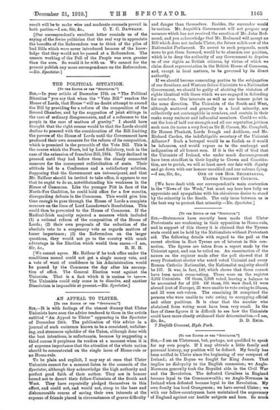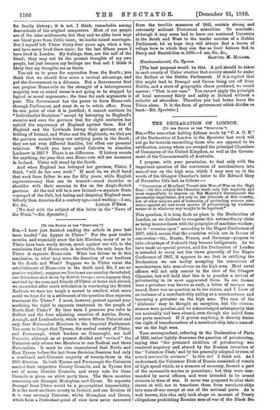[TO THE EDITOR Ow THE "Brume:mm1 SIR, —I am an
Ulsterman, but, perhaps, not qualified to speak for my own people. If I may obtrude a little family and personal history, my position will be clamed. My family has been settled in Ulster since the beginning of our conquest of Ireland ; at the Boyne we fought for King James. That implies no disloyalty to the English connexion; we Anglo. Normans generally took the Royalist side in the Civil War and the Revolution. The defeated Cavaliers in England became loyal to the Commonwealth; we Anglo-Normans in Ireland when defeated became loyal to the Revolution. ity own family has bred Orangemen ; we have served Ulster; we with our fellow-countrymen have maintained the supremacy of England against our hostile subjects and hers. So much
for family history ; it is not I think, remarkable among descendants of the original conquerors. Most of our people are of the later settlements, but they and we alike have kept our blood pure from Celtic taint ; we loathe mixed marriages. But I myself left Ulster thirty-four years ago, when a boy, and have never lived there since; for the last fifteen years I have lived in London. My feelings, then, are the call of the blood; they may not be the present thoughts of my own people, but just because my feelings are that call I think it likely that my thoughts are as theirs.
You ask us to press for separation from the South ; you think that we should thus score a tactical advantage, and put the Government on a dilemma. But a Government that can propose Home-rule on the strength of a heterogeneous majority won on mixed issues is not going to be stopped by logical or moral arguments ; the time for such arguments is past. The Government has the power to force Home-rule through Parliament, and must do so to retain office. From its own point of view it is justified; it cannot continue its "Individualist Socialism" except by betraying to England's enemies and ours the garrison that for eight centuries has upheld the supremacy of England against them. But if England and the Lowlands betray their garrison at the bidding of Ireland, and Wales and the Highlands, we that are the garrison cannot betray our outlying posts in the South ; they are not even different families, but often our personal relatives. Would you have asked Calcutta to abandon Lucknow in 1857 ? There is no difference. If history counts for anything, the year that sees Home-rule will see massacre in Ireland. Ulster will stand by the South.
And when England has betrayed her garrison, Ulster, I think, " will do her own work." If need be, we shall hand that work from father to son for fifty years, while English regiments—any that can be trusted—stand shoulder to shoulder with their enemies to fire on the Anglo-Scotch garrison. At the end will be a new Ireland—a separate State —purged of the Celt, but hating and despising England more bitterly than America did a century ago,—and waiting.—I am, Sir, &c., LEsia-R D'Essz. [We deal with the subject of this letter in the "News of the Week."—En. Spectator.]







































 Previous page
Previous page